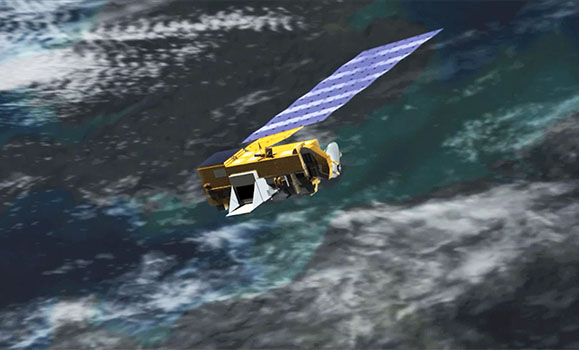Polluters beware: you can’t hide anymore.
Data collected from NASA’s Aura satellite has revealed 39 unreported major sources of pollution across the globe. Using newly created methods of detection, an international team including Dalhousie professor Randall Martin found that unreported sources account for about 12 per cent of all human-made emissions of sulfur dioxide — a finding that has significant ramifications for understanding the compound’s impact on both human health and climate change.
Other partners in the research included Environment and Climate Change Canada (ECCC), NASA and the University of Maryland.
New discoveries
Sulfur dioxide is a chemical compound released naturally by volcanic activity, but which can enter the atmosphere as a pollutant through the burning of fossil fuels. Using observations from the Ozone Monitoring Instrument aboard the Aura spacecraft, researchers were able to examine the first real observations of sulfur dioxide emissions.
According to Dr. Martin, co-author and faculty member in the Departments of Physics & Atmospheric Science and Chemistry at Dalhousie, current estimates are based on known information about where and when fossil fuels are being burned.
“These bottom-up estimates are exceedingly difficult in certain parts of the world,” he explains.
Published in May’s issue of Nature Geoscience, the study found that most of the unreported and underreported sources of toxic sulfur dioxide emissions came from coal-burning power plants, smelters, and oil and gas operations in Mexico, the Middle East and parts of Russia. The researchers were also able to identify 75 natural sources, such as non-erupting volcanoes, slowing leaking the gas throughout the year. These natural sources often go unmonitored because of their remote locations, and in some cases the satellite data found their emissions to be two to three times higher than expected.

NASA's Aura satellite (NASA photo)
Impacts on health and environment
Sulfur dioxide is a known health hazard and is one of five air pollutants being constantly monitored by ECCC. When it enters the atmosphere it reacts to form sulfate particulates. “When we breathe those particulates, they are harmful to human health,” says Dr. Martin. “Particulate matter is now believed to be the leading environmentally related risk factor for premature mortality worldwide.” says Dr. Martin.
It’s estimated there are close to 3 million premature deaths globally each year related to outdoor particulate matter — exceeding risk factors that often get more attention, such as malaria, high cholesterol and physical inactivity. Sulfur dioxide is also a main component in acid rain causing damage to plants, watersheds and ecosystems.
Knowing exact emission sources and having accurate measurements of pollutant concentrations are crucial in the creation and evaluation of regulatory policies for air quality.
“Predictions of climate change require an accurate estimate of current air quality levels, says Dr. Martin. “For a source that is generally believed to be well characterized, the fact that the sources could be underestimated by 10 per cent is actually very large; it's striking.”
Using the data
The team was able to find the unaccounted sources through an improvement in the computer processing that transforms raw satellite observations into precise estimates of sulfur dioxide concentrations. These precise estimates meant the gas could be detected in smaller concentrations, allowing researchers to trace emissions scattered and diluted by the wind back to their original sources by using accurate measurements of wind strength and direction.
The next step is incorporation of this data into scientific models that will assess the repercussions for human health and for climate. The methods will also be used in gather data on other air pollutants such as nitrogen oxides, creating a more complete picture of global air pollution.
Comments
comments powered by Disqus

